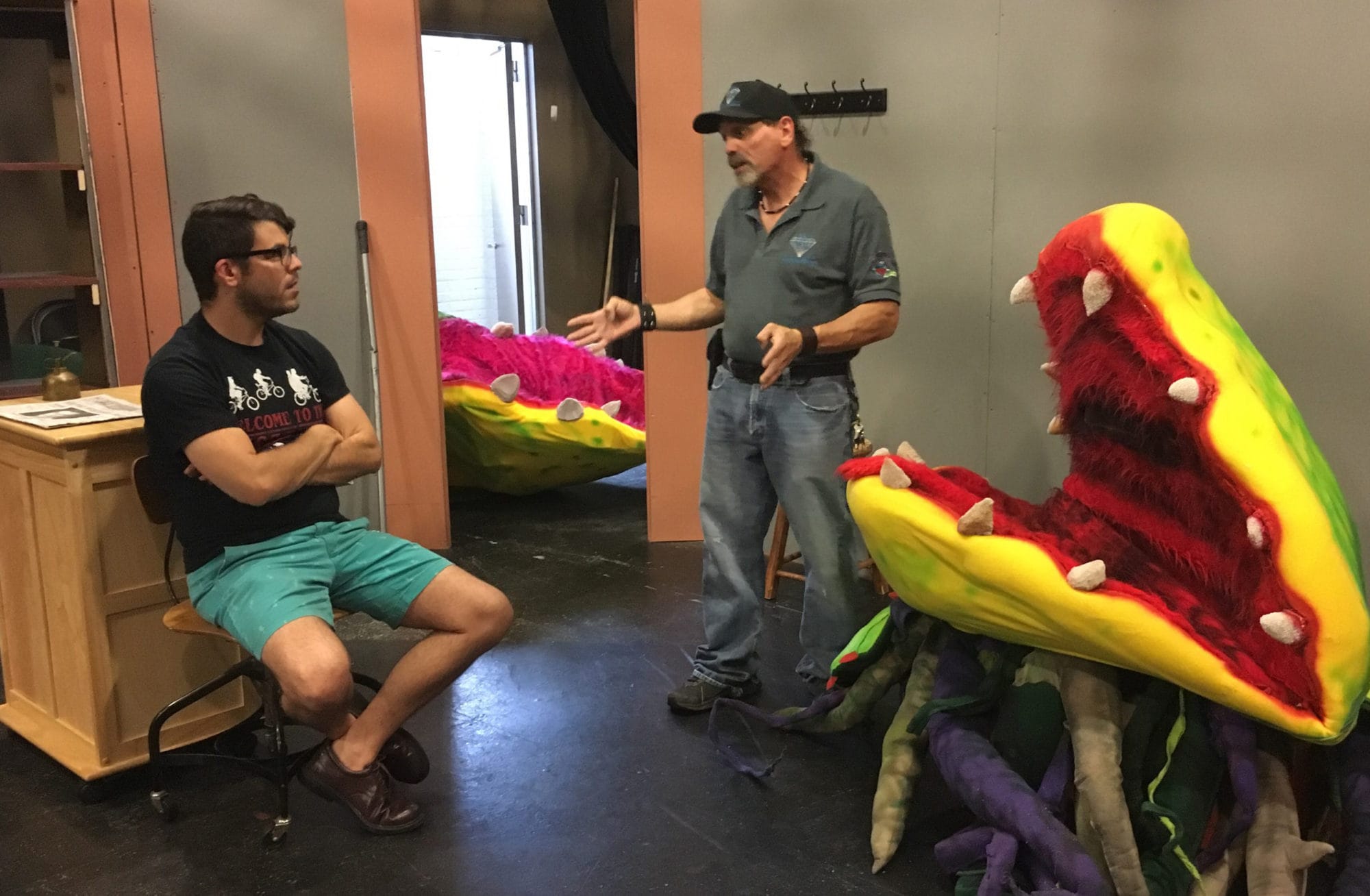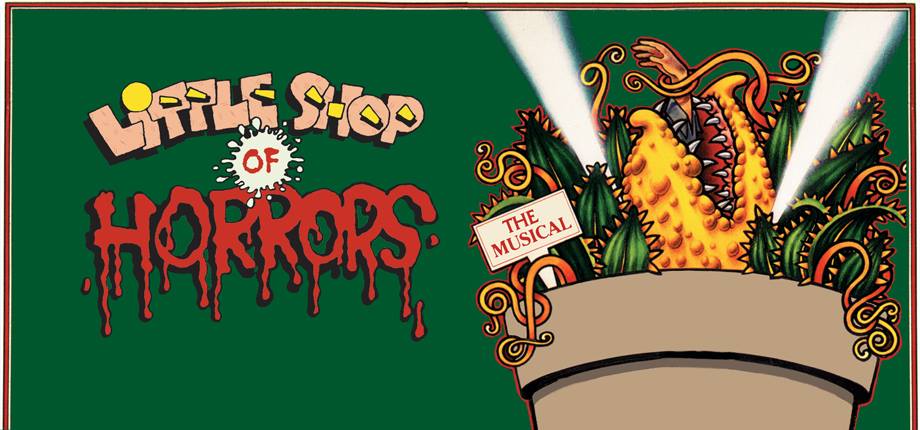The Workhouse Arts Center rocks an audacious combination of classic rock, classic longing, and sci-fi horror show in a hyperkinetic presentation of Howard Ashman and Alan Menken’s Little Shop of Horrors.
Most of us know Ashman and Menken for their Disney work. In Little Shop they mix a dash of the Trojan War, a scattering of divine intervention, and a nod to patricide to cook up a tale of dreams come true that will frighten us all back to our roots. Director Dan Stapula, Music Director Darin Stringer, and this talented cast and crew have placed this explosion of color and energy into the Workhouse space, an intimate cocoon of sound and story perfect for this tale. Jonathan Faircloth’s choreography brilliantly dimensionalizes the soundtrack of bebop and raw rock and roll (and a charming Wedding Hora repurposed for a touching moment, complete with handkerchief).
As the lights rise on Little Shop of Horrors three streetwise Urchins (a dazzling trio of Carrie McKnight, Khanner Hancock, and Benita Adams) step out, Muse-like, and introduce us to Mr. Mushnik (Rich Amada), a failing skid row florist. He is joined in his depressing, empty shop by his beaten-down assistant Audrey (Holly Kelly) and his klutz of a shop schmuck Seymour Krelborn (Casey Fero). Mr. Mushnik shouts at the Urchins, his staff, and the Almighty as he rails against his fate. Each of the characters sings of their depressing lives in a rocking rendition of “Skid Row (Downtown),” aching for escape, each calling on some higher power, begging the Fates, anyone to come down and lift them from their dead-end lives. Little do they know, in the back of the shop Seymour has already found the “strange and interesting” new plant, a real deus ex machina that propels them to their dreams – or does it?
Casey Fero is full of life – honest, innocent, and authentic as the fresh-faced nebbish Seymour. After tripping and dropping a few more plants and surviving yet another tongue-lashing by Mushnik, he sings soulfully of “moving heaven and hell” to get out of skid row. As he moves from Man to Superman, Seymour never loses his innocent desire to do right, even if nature, nurture, and now even the gods in the form of a great green goliath (voiced in buoyant, blissful bass by Antonio Bullock) conspire against him.
Holly Kelly brings touching vocals and tragic grace to the role of Audrey, the self-destructive object of Seymour’s love. Hoping to escape the gutter, Audrey picks a path destined to destroy her by a thousand bruising moments, a liaison with the overachieving purveyor of painful dentistry, Orin Scrivello, played with feral intensity by a multitalented Jay Tilley. Kelly softly uncovers the vulnerable layers of Audrey as she sings an aria to her innocent embrace of the classic suburban dream and offers herself to others throughout the story, aspiring to her future “somewhere that’s green.” Tilley rocks and rolls, growls and debases, commanding the stage even through the barrier of a Jules Verne device that would make any steampunker proud. Tilley turns multi-floral throughout the second act, bringing great skill to quick changes and character development with several well-crafted takes on the high and mighty that tempt Seymour as he enters the desert of modern media fame.
Carrie McKnight (Chiffon), Khanner Hancock (Crystal), and Benita Adams (Ronnette) as the Urchins open the show with a powerful shake, rattle and roll and continue to elevate the heat and the tempo throughout. These enchanting balladeers are by turns the Fates, a Greek Chorus, and a Goddess Triad as Hera, Athena, and Aphrodite, helping steer Seymour to his true love. They are wise and ironic, each possessing elegant timing as they play off one another and the rest of the cast both musically and physically.
Mr. Mushnik is the real deal, as played by a delightful Rich Amada. He is gruff and mean-spirited when but a poor shopkeeper, magnanimous if not still a bit short-tempered as he grows in wealth, and positively endearing as he sits with the Urchins on the stoop of the shop, coaching Seymour through the radio. With a look, a face, a move, Amada tells the story of Mushnik’s journey from the steppes of Russia to his current pursuit of the American Dream.

Antonio Bullock and Liz Colandene jointly create the beating (or is it just eating?) heart of the show, the many forms of Audrey II. Bullock’s basso vocalization of the puppet plant melts all within hearing as he charms, cajoles, disarms, and demands his way to domination. Colandene coordinates the puppet’s movements as it grows from pot to pallet, animating its wagging floral face and opening its crimson mouth with comic timing that make one think it truly has eyes and ears as it notices all around it. Colandene also takes a silky turn onstage in the first act as the flirtatious Street Walker, enticing a tipsy Bullock to a promising evening of alley-catting splendor.
The music provided by the Band (Darin Stringer, Merissa Driscoll, Theresa Arnold, Christopher Willett, Robbie Taylor, and Ben Irwin) is as important to the show as the dark spirits in Audrey II’s malignant soul. The band provides perfect pacing, staying close to the actors and filling the theatre with sound that lifts the action and drives the audience onward. Time passes unnoticed as the intertwining dance of vocals and instruments keep us all on delicious edge throughout.
Costumes by Mary Beth Smith-Toomey and Priscilla Stapula are giddy fun, from the thrift-store couture of the skid row denizens to the Mad Men suits and flashing bling of the media glitterati. When the Urchins alight in ruby splendor, it feels like the Supremes have come to save us all. Stage Manager Joshua Stout runs a tight show with nary a moment wasted nor a missed cue. Clare Pfeifer’s sound is perfect for the small, 100-seat theater, balanced well between the actors and the band, and keeping crisp the complex dialogue and lyrics throughout. Lighting by Joseph Wallen is steady and well-focused, with only a few moments when the actors at the edges drift away a bit.
Bring your dreams to this cast, crew, and Audrey II for a night of magic that might have a special catharsis in store for you, too.
Running Time: Two hours, with one 15-minute intermission.
Little Shop of Horrors plays through June 30, 2019, at The Workhouse Arts Center, Building W-3 (Theatre), 9518 Workhouse Way, Lorton, VA. Purchase tickets at the door, call the box office at 703-584-2900, or go online.
[Related: Legendary Puppeteer Bill Diamond Helps Bring ‘Little Shop of Horrors’ to Life at Workhouse Arts Center, by David Siegel]





